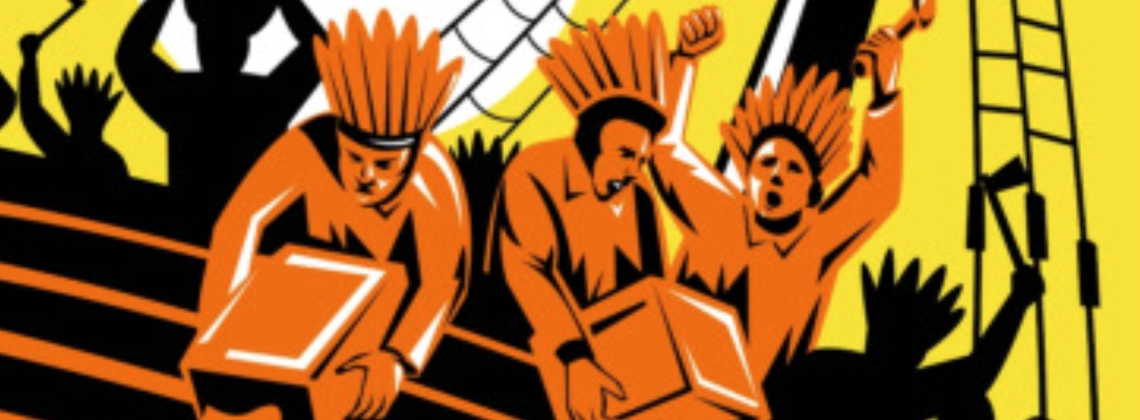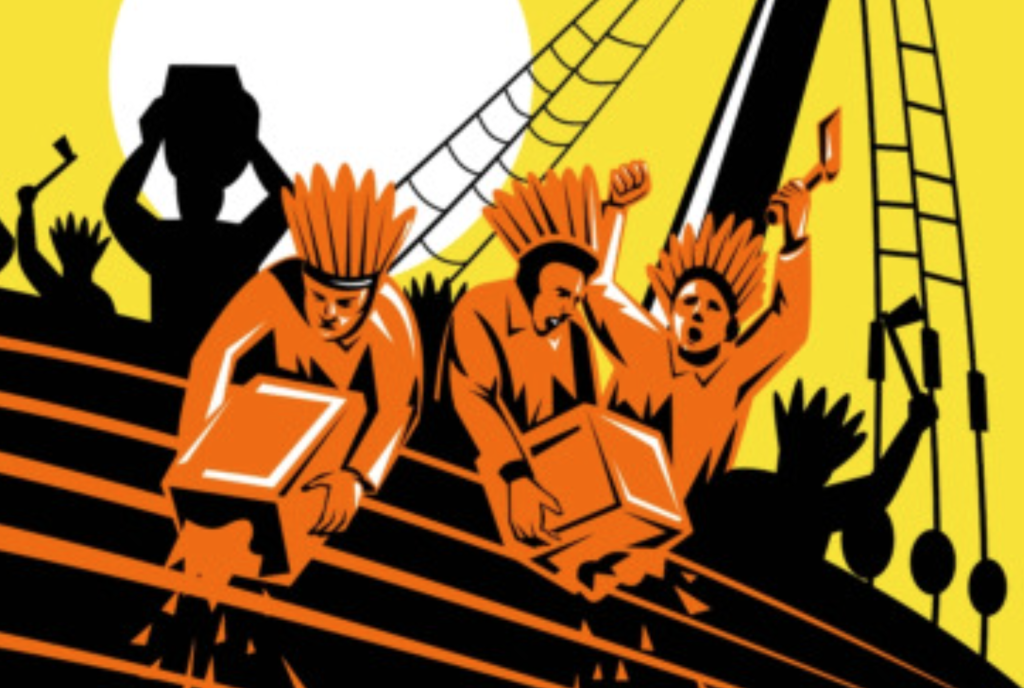

The Boston Tea Party at 250 is a vindication of democracy over autocracy
“Semiquincentennial” sounds like a cancer, but it actually means a 250th anniversary. Expect to see it often in the next few years, because America is almost 250 years old. On July 4, 2026, our experiment in self-rule will have lasted two and a half centuries. The first big anniversary comes this weekend: 250 years since the Boston Tea Party.
It is now fashionable, however, to disdain the Revolution, and to become jaded and pessimistic about American democracy. Our internal divides are too great, our social media too loud, our leaders too incompetent to knit the fabric back together. And if American democracy is lousy now, the rot probably began with an imperfect creation at the Revolution. The rioters on January 6 called themselves patriots, so that must mean that the revolutionary ethos is sick, and that the original patriots were just white conservatives smashing and yelling.
But the Boston Tea Party was no riot. The Revolution mattered. And it turns out that the Tea Party of Dec. 16, 1773 was the exact opposite of January 6. The tea-destroyers of ‘73 were fighting against autocracy. And so are we.
The biggest myth about the Revolution is that it was just a bunch of rich white guys who didn’t want to pay taxes. Actually, the Tea Act of 1773 that caused all the trouble would have reduced taxes on tea in the colonies. The tea tax had been enforced for years. All Parliament did in 1773 was insist that colonial tea could only be received by certain designated merchants picked by the London government.
The hullaballoo, in short, was not over the cost of tea. The problem for the colonists was that Parliament could not make laws from London that were binding in Massachusetts (or any other colony). For decades the British empire had operated in a patchwork fashion; colonies in North America elected local legislatures while colonies in India were virtual dictatorships run by the East India Company. North American legislators had been crafting laws for themselves from their earliest years of settlement until the end of the French and Indian War, which Britain won by committing vast resources to the fight in North America. Badly in debt, Britain’s Parliament opted to bring the entire empire into a single working system, and it started by jacking up local taxes on North American colonies.
These were the famed Sugar Act, Stamp Act, and Townshend Acts, all rolled out between 1764 and 1770. The objection raised by their colonial opponents—who began to call themselves “patriots”—was not that taxes had gone up, but that Parliament could not make laws for them because no American colonist voted for any members of Parliament. The patriots insisted that their local colonial governments—the ones they voted for—were the only bodies that could make laws for them.
When the (ostensibly) free colonists of North America defied Parliamentary law, the British government went after their right to self-rule. Britain’s Quartering Act required that colonial governments house the British soldiers sent to protect them. New York’s legislature refused to comply. Britain suspended the colony’s legislature until they agreed to pay to quarter the troops, as required by law.
The patriot John Dickinson wrote that the people of New York “cannot be legally deprived of the privilege of legislation.” If they could lose “the privilege of legislation, why may they not, with equal reason, be deprived of every other privilege?”
In other words, if Parliament could shutter a legislature and thereby invalidate an election at will, then the colonies had no self-government at all. While Massachusetts and the other British colonies were not at that point full democracies as we would understand the term, the fight against Parliament probably broadened the number of people involved in the political process. When the royal governor of Massachusetts forbade his legislature from even discussing the Tea Act in 1773, Sam Adams started gathering citizens in a large group simply called “the Body”—one that took votes, passed resolutions, and sent guards to make sure no tea was unloaded on Boston’s docks. As historian Ben Carp has shown, the Body included all sorts of people who couldn’t vote—women, young people, and even African Americans. “The Body” was a far more representative body than was the electorate of Massachusetts—and it was the Body that understood and demanded that some part of the government had to derive from the people.
In response, Parliament and the crown shut down the legislatures.
The same thing happened this year: Florida Governor Ron DeSantis removed four elected prosecutors from office because he didn’t care for their politics. In other words, Floridians can only elect people their governor approves of. Who knew? Ron DeSantis is George III.
So 2023 echoes 1773. We too have seen manifold efforts to invalidate elections and make democracy harder: revisions to the political system touted as necessary reforms that in fact attack the heart of democracy. Gerrymandered districts. Arcane election laws that make voter registration difficult. Attacks on election officials.
Recent efforts to close polling places in large cities literally repeat the complaint Jefferson made against the king in 1776: George III refused to provide “accommodation of large districts of people, unless those people would relinquish the right of Representation in the Legislature.” It’s right there in the Declaration of Independence.
The tax in 1773 was less important to patriot agitators than the insistence by London that it could decide who would and would not sell tea. Parliament and King George proclaimed they were the embodiment of the nation, and because they were the nation, any opposition was treason.
At the Boston Tea Party, the patriots said no. And 300 chests of tea floated away in defiance of Parliament and king.
“Freedom” for the patriots of 1773 was not just a euphemism for good feelings, or the ability to be free of any law they disliked. Freedom and liberty were the right to vote and elect their own leaders—to govern themselves, rather than to be governed by those who claimed the mantle of tradition or of national greatness. When the tea arrived, the patriots pulled off an astonishing feat. They did not, in fact, have a riot. No one was killed, and the only damage done was to the tea itself. There was no generalized violence. It was an act of civil disobedience.
In response, Parliament and King George suspended the Massachusetts government and installed a military rule. Tyranny was plenty real in 1773.
Democracy and autocracy are facing off once again. In this struggle we can take heart from the Boston Tea Party, which was not a riot to destroy democracy but a punctuated effort to prove that freedom means free elections and representative government. Without the right to elect and be elected, other freedoms are mere words. That is the legacy of the Boston Tea Party, and it is one those who love democracy can be proud of.
Adam Jortner is the Goodwin-Philpott Professor of History at Auburn University, and the author of Audible’s anniversary series, The Hidden History of the Boston Tea Party.
Nice!